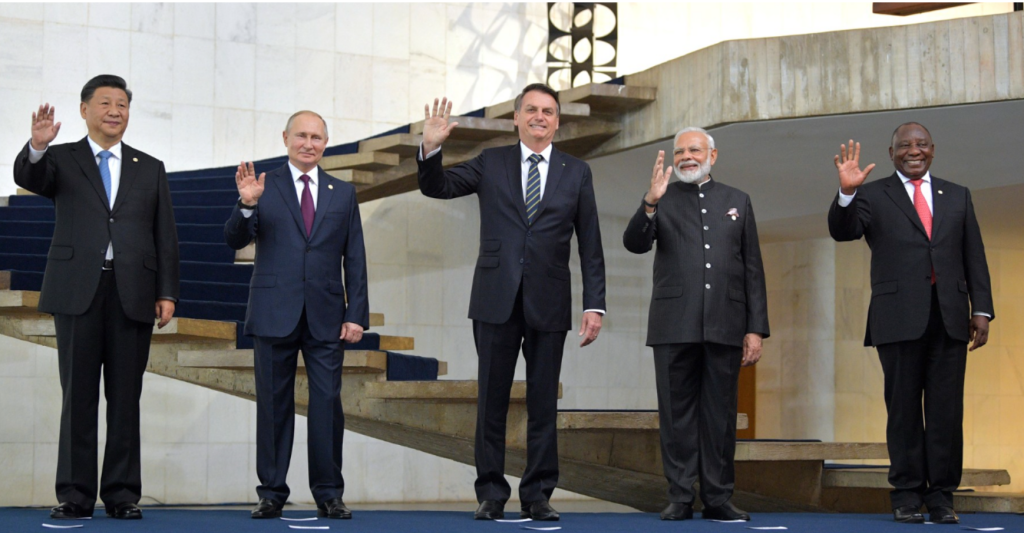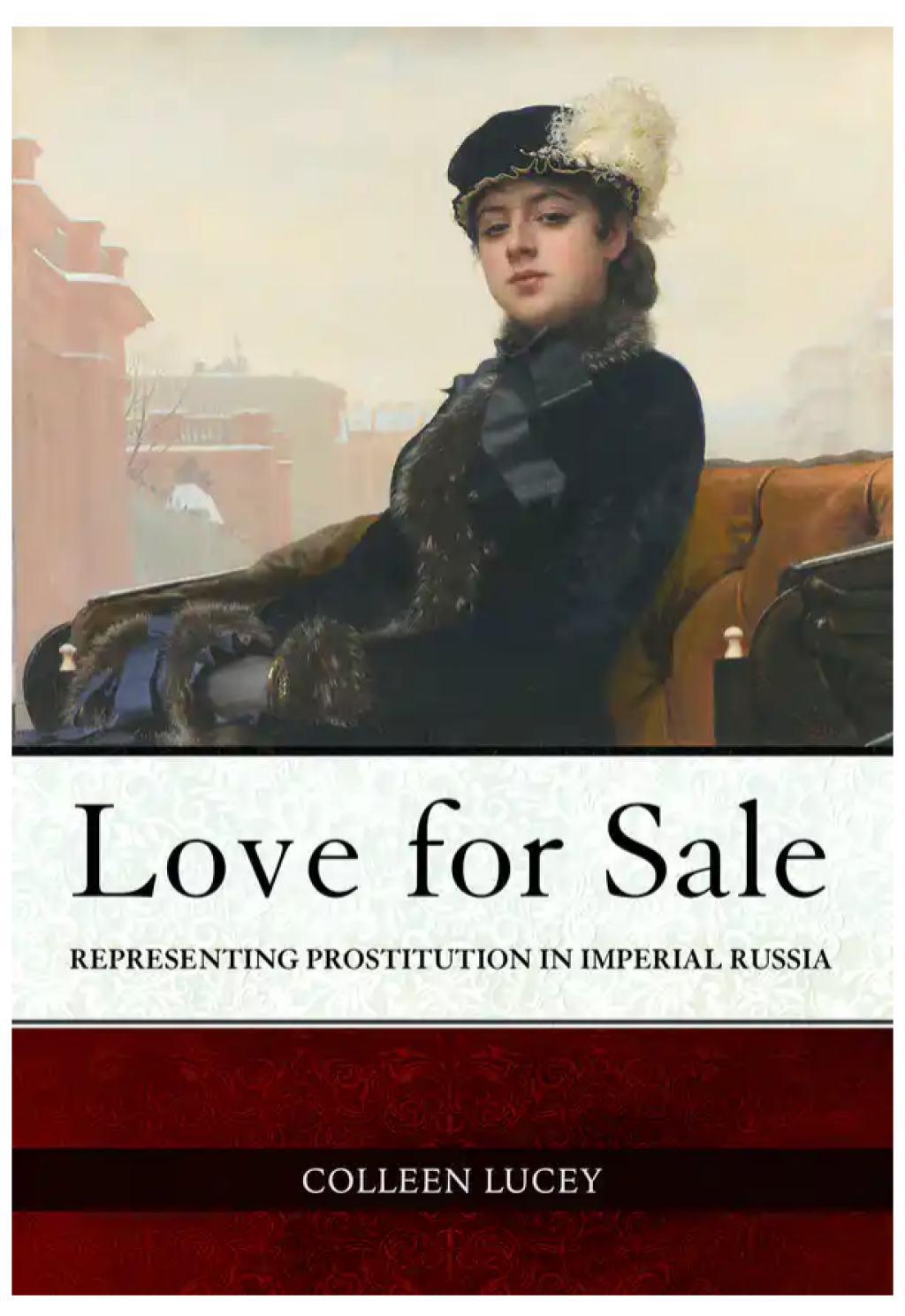The Jordan Center stands with all the people of Ukraine, Russia, and the rest of the world who oppose the Russian invasion of Ukraine. See our statement here.
Edyta Bojanowska is the author of A World of Empires: The Russian Voyage of the Frigate Pallada (2018) and Nikolai Gogol: Between Ukrainian and Russian Nationalism (2007).
Above: Putin with the leaders of BRICS nations in 2022. Source
The toxic brew of grievance, defiance, and menace toward the “West” in Putin’s celebratory September 30 speech on the illegal annexation of four Ukrainian provinces is a historically familiar reaction to Russia’s loss of control over its former imperial borderlands. Demonizing the “West” masks Russia’s neo-imperial designs on Eastern Europe, which today means Ukraine. Russia never truly confronted its colonial past, and to this day perpetuates blatant imperial myths.
While denying the reality of Russia’s own imperialism, Putin now exploits the colonial wounds of Asia, Africa, and the Americas to cast Russia as the global champion of anti-colonialism. This anti-colonialism, like the Soviet one before it, has become a tool in the Kremlin’s well-funded repertoire of soft power. In a transparent attempt to break Russia’s international isolation, Putin is appealing to the countries of the so-called global South to join Russia’s anti-colonial crusade against their former Western colonizers purportedly headed by the “satanic” hegemon-in-chief, the USA. It is not a coincidence that the various derivations of the word “colonialism” appear 13 times in Putin’s 37-minute speech.
Certainly, anti-colonial critique is still welcome in today’s world: patterns of colonial exploitation are far from overcome. Yet Russia—and especially Putin, the “butcher of Grozny”—make for gallingly hypocritical mouthpieces.
Among the thirty-seven worn-out propagandistic formulas compiled by the dissident Russian media outlet Meduza, we find in Putin’s speech standard Soviet-era bromides—maddening to any historian of Russia’s imperial expansion—about the essential benevolence of the tsarist and Soviet empires. The Russian Federation, we are told, is the inheritor of the proud “thousand-year-old” Russian state, an exaggeration that is several centuries off. Repeating what he would have learned in his Soviet school, Putin claims that this state grew through the consensual and spontaneous coming-together of various indigenous populations under Russia’s aegis (some others might say yoke). Whereas Western empires pillaged and exploited, he continues, Russian rule meant harmony and progress for its subjects. Clearly signaling toward the formerly colonized non-West, Putin touts the Soviet Union’s supposedly anti-colonial and anti-racist traditions.
While the policies he describes did exist, they were embedded in Cold-War rivalries that compromised their purported virtuousness. The Soviet Union, like the tsarist Russian empire before it, protested all colonialisms and racisms other than its own. The decolonization of former Western empires mattered to the Soviets primarily as a tool to diminish their geopolitical rivals’ power.
Laser-focused on the colonial misdeeds of others, the Russian and Soviet empires conveniently ignored their own. Russian schoolchildren do not learn about indigenous Siberians hanged from meat hooks for failing to deliver the tsar’s quota of pelts. Or about the 1860s Circassian Trail of Tears that left the Caucasus’ Black Sea coast littered with corpses. They do not learn about Stalin’s genocidal reshufflings of non-Russian populations as a colonial policy aimed to solidify Russian rule. And what is Russia’s annexation of Crimea, and now of the Portugal-sized additional chunk of Ukraine, if not a brazen imperial land grab? Why were no referenda offered to the Chechens and the Daghestanis back in the 1990-2000s when they strove to end their imperial subjugation to Russia?
The French settlers left Algeria after decolonization. Had they remained, imagine the world’s reaction to a hypothetical French military invasion of Algeria in 2022 to protect the rights of the ethnic French. Having gained their independence after Soviet collapse, Ukraine and the Baltic states hospitably chose not to expel their respective Russian populations. And now, it is purportedly to defend these Russians’ interests that Putin invaded Ukraine and threatens the Baltics. The boundaries of his world are those of Russian speech, and not of sovereign states.
Yes, the Soviet Union denounced Western racism, but it allowed its own to flourish. Racism remains a prominent feature of the post-Soviet Russian present, enabling the government to send disproportionate numbers of the country’s ethnic minorities to the Ukrainian front.
Langston Hughes, understandably, formed a positive view of the Soviet Union when traveling from Moscow to Tashkent in a train compartment that wasn’t “Jim Crowed.” Could he have sustained this view had he witnessed other Soviet train journeys? In 1944, for instance, nearly the entire Tatar population of Crimea was herded into cattle cars and shipped to Central Asia and Siberia, a journey took the lives of tens of thousands of people and made the survivors into Soviet "non-persons.”
The Russians’ failure to account, much less atone, for their imperialistic past is amplified by educational institutions and now undergirds whatever support Putin enjoys in his brutal war in Ukraine. Anti-imperial conversations stirred in Russia in the 1920s, and again in the 1990s, only to be shut down. Most recently, Putin and his government have made such debates potentially illegal by clamping down on freedom of expression and issuing edicts safeguarding triumphalist and nationalistic versions of Russian history. Young activists are free to discuss the critical consequences of this failure only outside of Russia.
Russia’s imperial sins remain less visible to many in Africa, Asia, and the Americas. Some in the Global South are, understandably, grateful for past Soviet military, economic, and educational aid in their anti-colonial struggles. The effects of Russia’s hypocritical manipulations are likely a major factor behind the abstentions on the UN resolution condemning Russia’s illegal annexation. But by sympathizing with Russia, the former victims of European colonization turn a blind eye to the suffering of Russia’s own colonial victims, a group that today includes Ukrainians. This is not a morally defensible form of anti-colonial solidarity, though it certainly helps these countries secure Russian guns, oil, and grain.
Whatever their pragmatic benefit, how do such attitudes become entrenched? From the zoomed-out perspective of half a world away, Russia’s imperialistic injustices fade from view. If your historical experience tells you that a sharp racial antagonism is the cornerstone of colonial oppression, the Russians’ attempts to “reunite” with what they claim to be their Slavic kinfolk lacks the optics of an imperial usurpation. Is Russia’s expansion into adjacent territories somehow more benign and “natural” than Western empires’ overseas jaunts? The particularities of Russian imperialism blur its very existence for all who examine it through a Western lens.
While inveighing against Western colonialism, Putin wants the world to forget that Russia is the only European state that has engaged in a reconquest of its former imperial dominions. In his speech, he calls the four annexed provinces Novorossiya, meaning “New Russia.” This term is the imperial administrative designation of Crimea and the adjacent Black Sea coast coined after Russia’s 1783 conquest of the Crimean Khanate. Putin’s manipulative argument is that this territory does not belong to Ukraine. And if the eighteenth-century map of Novorossiya is any guide, the reconquest is unlikely to stop there.
Many commentators seem to find legitimate the idea that, although countries have borders, a country like Russia is entitled to a “sphere of influence” or “buffer zone.” But Russia’s fundamental geopolitical problem is that almost no one wants to join its clubs voluntarily—either its Eurasian Economic Union, or other forms of military or strategic partnership where it plays a central role (Russia’s “limitless” friendship with China, premised on Russia’s willingness to become China’s resource colony, is not in this category). So Russia relies on economic, political, or military compulsion, or on offers of dictator-propping assistance, as in Belarus. If courtship fails, a captive bride will do.
The historic task of overcoming Europe’s imperialistic legacies must include those of Russia. Commonly ignored in Western-focused accounts of European imperialism, Russian imperialism has proven resilient and dangerous. It is Russia’s imperial rapacity, not the voluntary accession of new countries to NATO, that most threatens a rule-based international order.



